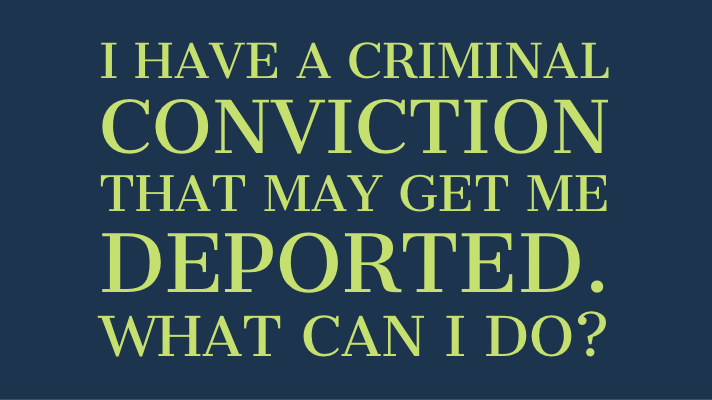
Criminal convictions are a primary basis for deportation or denial of immigration benefits, like greencards, visas, and naturalization. A criminal conviction can have devastating consequences on your immigration options. Some convictions may result in deportation. Some may not. Immigration is controlled by federal law. Most convictions are based on state law. Whether a state conviction qualifies as a deportable offense under federal law is often a complicated analysis that is commonly litigated in courts across the country. The best course of action when you are charged with a crime is to consult with an experienced immigration lawyer who has criminal law experience. Then make sure your criminal defense lawyer and immigration lawyer discuss the best options for your criminal case and how a conviction will affect your immigration case. But what if it’s too late? What if you already have the criminal conviction and are only now being told that you can be deported because of that conviction. Or what if you are being told that you can’t apply for an immigration benefit because of your criminal conviction?
Is there anything I can do?
Once you plead guilty or no contest or are found guilty by a jury, it becomes increasingly difficult to fight your conviction. However, there may be an avenue of hope. The law in the State of Florida allows you to go back two years to challenge a conviction if your criminal defense attorney made certain mistakes. For example, if your criminal defense attorney did not properly advise you of the immigration consequences of your criminal conviction, you may be able to reopen the case and negotiate a more immigration friendly plea.
My lawyer didn’t advise me of the immigration consequences, so I should be good right?
Not so fast. It’s more complicated than that. You would have to file a Motion for Post-Conviction Relief alleging that your criminal defense attorney was ineffective because he or she failed to properly advise you of the immigration consequences. You would also have to establish that you entered your plea of guilty or no contest because you didn’t know you could be deported. And you can’t establish this by your word alone. After filing the motion, the trial judge will conduct an evidentiary hearing where your prior criminal defense attorney will testify and you would testify. The judge would determine based on all of the evidence whether the attorney was ineffective and whether you were prejudiced by that attorney’s ineffectiveness.
In other words, if the judge finds that the criminal attorney didn’t properly advise you of the immigration consequences, but that you would have pled guilty of no contest anyway because the evidence was so strong against you, the trial judge could deny the motion and the conviction would stand. However, deportation is a drastic, often catastrophic consequence, and judges will often determine that you were prejudiced if the criminal attorney did not properly advise you.
What happens if the judge grants the motion?
If the judge grants the motion, your case is reopened and you start back as if you were on the day before you entered the plea of not guilty or no contest. Your options would be to negotiate an immigration friendly plea with the prosecutor or to go to trial. Many times, criminal defense attorneys are able negotiate with the prosecutor before filing the motion and come to an agreement that the prosecutor won’t object to the Motion for Post-Conviction Relief, in exchange for you pleading to an immigration friendly plea. Then, the judge may agree to reopen the case, the prosecutor would amend the charge to one that would not make you deportable and you would re-enter the plea to the non-deportable charge. This requires both the prosecutor and judge’s cooperation.
Will the conviction go away for immigration purposes if the judge grants the motion for post-conviction relief?
Once the judge grants the motion for post-conviction relief and reopens the case, you are no longer convicted of that offense anymore. It is now pending. But is that the way the immigration courts look at it? It depends. The wording in the criminal judge’s order is very important. If that order states that the conviction is being overturned in order to avoid immigration consequences, then it will still be a conviction for immigration purposes. But if the criminal judge’s order states that the conviction is being overturned for legal reasons, than it will not be a conviction for immigration purposes. Make sure that your criminal defense attorney either practices immigration law or communicates with an immigration lawyer to get the wording in the order correct.

Jeremy Lasnetski is a partner at the Law Offices of Lasnetski Gihon Law. The firm focuses on criminal defense, immigration and personal injury. Mr. Lasnetski focuses his practice on immigration and criminal defense. Mr. Lasnetski is the former Jacksonville Regional Vice Chair of the American Immigration Lawyer’s Association, Central Florida Chapter and has represented clients in deportation proceedings, USCIS benefit cases, consular processing cases, and more. He routinely gives presentations on immigration law issues to both criminal and immigration lawyers at conferences and seminars throughout the State of Florida.
 Florida Immigration Lawyer Blog
Florida Immigration Lawyer Blog

